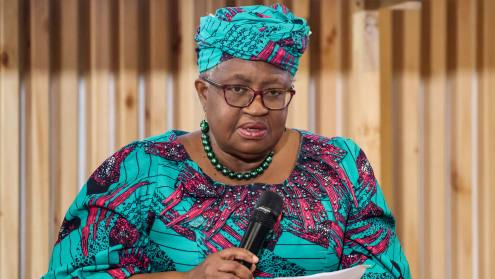As 2023 almost comes to a close, Lucie Pinson, founder and executive director of Reclaim Finance, a French non-profit that reports on financial institutions’ progress on delivering on climate action, is cautiously upbeat.
The momentum around climate change and fossil fuel financing in 2023 is still building, she says, because the banking sector is at “the very beginning” of moving away from fossil fuels. But she highlights increasing progress around the “first pledges from banks to stop funding new oil and gas fields and to start restricting support for companies active in the oil and gas industry”. These commitments are a step forward, she says.
However, she believes more needs to happen in the private and public sectors in richer countries if negotiations at COP28 later this month are to have any chance of coming to an ambitious conclusion.
“I cannot write the future and see what will happen at COP28,” says Ms Pinson. “But there won’t be an ambitious text at the end [of the summit] on fossil fuels without a clear commitment from developed countries to phase out the fossil fuel industry in their own countries, consistent policies for companies and the finance industry stopping developing fossil fuel projects overseas.”
Ms Pinson suggests there is a problem of “economic diplomacy” that will not help negotiations at this year’s COP in Dubai. France is one of the few countries to have honoured its promise at COP26 to end public financing for fossil fuel projects, she remarks. At the same time, however, she highlights French president Emmanuel Macron’s “strong support for oil and gas projects from TotalEnergies”, including his backing for the company’s liquefied natural gas (LNG) plants when he visited Papua New Guinea at the end of July.
Banks can force change
“If banks are really serious about climate action they should push governments to act by announcing clear transition plans aligned to 1.5C and measures to reduce support to the fossil fuel industry,” says Ms Pinson.
She calls on banks to agree “new measures to stop supporting oil and gas projects” at home and overseas, while “supporting sustainable power projects in the global north and the global south”.
Most clean energy funding, says Ms Pinson, continues to flow to countries in the global north, but in the global south, “we need to avoid replacing the coal issue with the gas issue and locking in emissions for decades”. Natural gas is often seen as a transition fuel, but environmental groups warn that a growing reliance on LNG could mean “a very long lock-in effect for these fossil fuels”.
Ms Pinson says banks can force change by showing regulators they will “not be there” to finance fossil fuel projects. “Even if for the moment it is mainly European banks leading the way, reducing the number of banks operating in this market will increase the price of capital and make it harder for [fossil fuel] companies to secure support,” she insists.
However, decarbonisation targets alone are not enough to guarantee an end to the financing of polluting activities in line with carbon budgets, she clarifies. In October 2023, Reclaim Finance, in conjunction with other non-profits, published a Sustainable Power Policy Tracker examining whether the 60 biggest global banks have the targets and policies in place to ensure a transition to decarbonised power.
Only eight banks were found to have a target for financing sustainable power supplies: the French banks BNP Paribas, the BPCE group (which includes Banque Populaire, Caisse d’Épargne and Natixis), Crédit Agricole, Société Générale and La Banque Postale; the German bank DZ Bank; and Dutch banks ING and Rabobank.
Only two banks, La Banque Postale and Danske Bank, had committed to stop financing oil and gas expansion.
If banks are serious about the Paris climate agreement and getting global warming to stay within the 1.5ºC limit, Ms Pinson says they should also implement sectoral decarbonisation targets for energy-intensive sectors such as automotive, steel, cement, real estate, iron, aluminium or agriculture, as well as fossil fuels. “Sector policies are really needed and it is the responsibility of individual banks to move,” she says.
Some members of the Net Zero Banking Alliance (NZBA) have, since its foundation in April 2021, published sectoral decarbonisation plans. In October 2023, Deutsche Bank agreed an initial transition plan, which included specific targets for three sectors: coal mining, cement and shipping. The bank said it planned to publish a net-zero target for the aviation sector in 2024.
But Ms Pinson suggests, in general, ambitious sector policies “won’t come through the NZBA”, which today “has no stick” to force banks to act.
She also underlines the importance of richer countries and their financial institutions seeing through any promises they make and remaining credible. “A lack of confidence between developed and developing countries has indeed marred climate negotiations in recent years,” she says.
“Climate action is based on trust and on consistency,” says Ms Pinson, as policy-makers and corporates the world over gear up to defend climate action — and their own interests — at COP28.
Read other interviews from the COP28 preview series:












